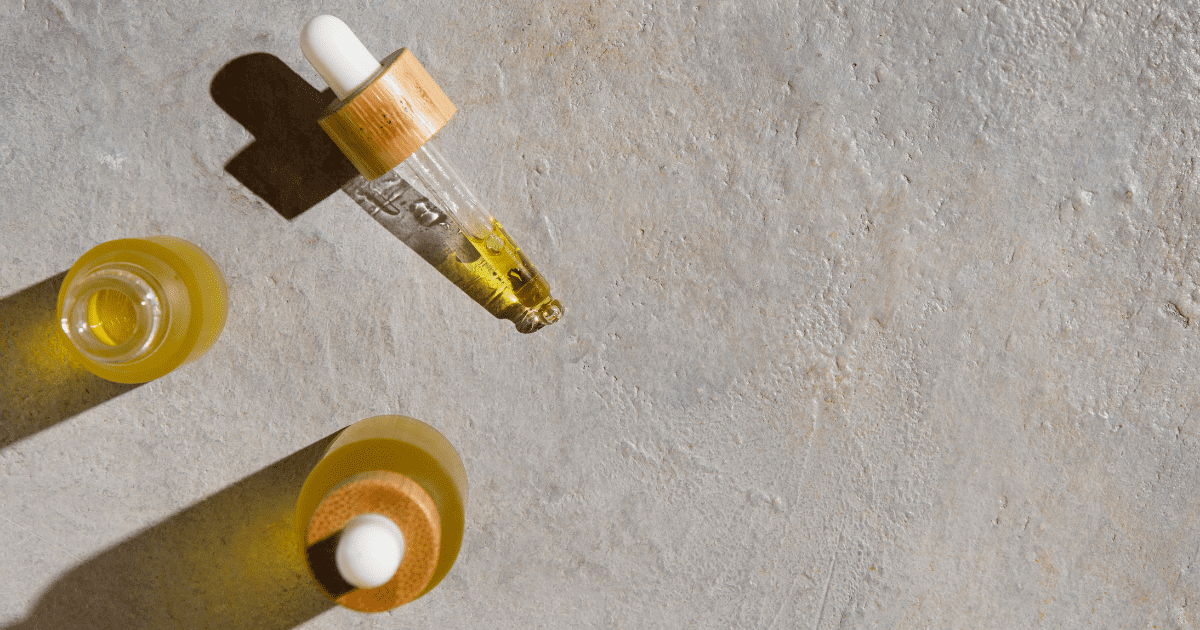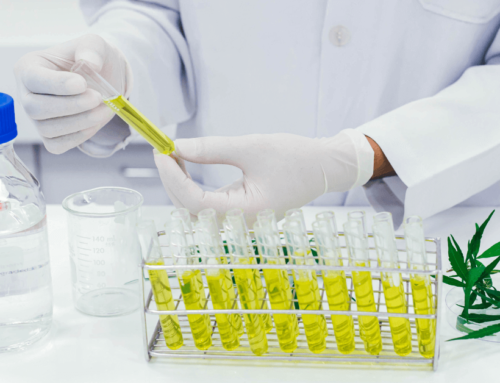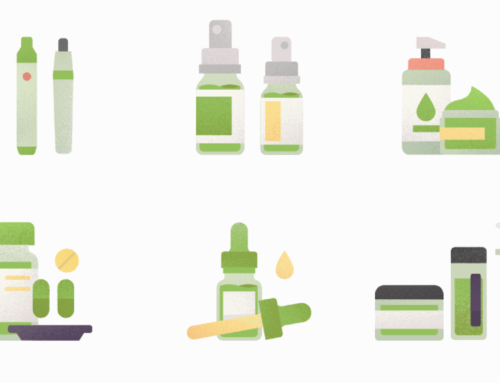Attention Deficit Hyperactivity Disorder (ADHD) affects millions of people worldwide, impacting their ability to concentrate, control impulses, and manage daily tasks effectively. As this condition continues to gain attention, alternative and complementary treatment options are being sought to alleviate its symptoms and improve overall quality of life. Among these alternatives, CBD (Cannabidiol), a non-psychoactive compound found in the cannabis plant, has emerged as a topic of interest in the context of ADHD management.
In recent years, CBD has garnered considerable attention for its potential therapeutic effects in various medical conditions, but its use for ADHD remains a subject of ongoing research and debate. Advocates of CBD suggest that it might offer a more natural and gentle approach to address some of the challenges associated with ADHD, without the adverse side effects often linked to traditional medications. However, medical professionals and researchers emphasize the need for further investigation to understand CBD’s safety, efficacy, and optimal dosages for ADHD treatment.
In this exploration, we delve into the current state of knowledge surrounding CBD for ADHD. We’ll examine existing research, potential mechanisms of action, anecdotal evidence, and the perspectives of medical experts to shed light on whether CBD oil could be a viable option for individuals living with ADHD. It is essential to recognize that while CBD shows promise, it is not a definitive cure or replacement for standard ADHD treatments. As with any medical consideration, consulting a qualified healthcare provider before initiating CBD use is crucial to ensure safe and informed decisions.
Join us on this journey as we navigate through the available information to better understand the role of CBD in managing ADHD symptoms and the potential implications for those seeking alternative approaches to conventional ADHD treatments.
What is CBD?
CBD, short for Cannabidiol, is one of the many active compounds found in the cannabis plant. It is a naturally occurring chemical that belongs to a class of compounds called cannabinoids. Unlike its well-known counterpart, THC (tetrahydrocannabinol), CBD does not produce a psychoactive “high” effect when consumed. This means that using CBD alone will not cause the euphoric sensations typically associated with marijuana use.
CBD is extracted from the hemp variety of the cannabis plant, which contains only trace amounts of THC, typically below the legal threshold of 0.3% in many countries. This low THC content is why CBD products are widely available and legal in various parts of the world, provided they comply with specific regulations.
Over the years, CBD has gained significant attention for its potential therapeutic properties. It is believed to interact with the body’s endocannabinoid system (ECS), a complex network of receptors and neurotransmitters involved in regulating various physiological processes, such as pain perception, mood, appetite, and immune function. While the exact mechanisms are not fully understood, it is believed that CBD may influence the ECS to promote a sense of balance and homeostasis within the body.
Due to these potential effects on the ECS, CBD has been explored as a complementary or alternative treatment for various health conditions, including chronic pain, anxiety, epilepsy, insomnia, and more recently, Attention Deficit Hyperactivity Disorder (ADHD). It is available in various forms, including oils, tinctures, capsules, edibles, topicals, and even as an ingredient in skincare and wellness products.
As with any supplement or medical treatment, it is crucial to consult with a healthcare professional before using CBD, especially if you are taking other medications or have underlying health concerns. This ensures that CBD is safe and appropriate for your specific circumstances and can be integrated effectively into your health and wellness routine.
What is ADHD?
ADHD stands for Attention Deficit Hyperactivity Disorder. It is a neurodevelopmental disorder that affects both children and adults, although it is typically diagnosed during childhood. ADHD is characterized by persistent patterns of inattention, hyperactivity, and impulsivity that interfere with daily functioning and can have a significant impact on various aspects of a person’s life, including academics, work, relationships, and overall well-being.
There are three main types of ADHD:
- Predominantly Inattentive Presentation: Individuals with this type primarily struggle with attention and focus. They may have difficulty sustaining attention, following through on tasks, organizing activities, and frequently forget details in daily activities.
- Predominantly Hyperactive-Impulsive Presentation: This type is characterized by hyperactivity and impulsivity. People with this presentation may find it challenging to sit still, have a constant need to move or fidget, act impulsively without considering the consequences, and interrupt others during conversations or activities.
- Combined Presentation: This is the most common type of ADHD, where individuals experience symptoms of both inattention and hyperactivity-impulsivity.
The exact causes of ADHD are not fully understood, but it is believed to result from a combination of genetic, environmental, and neurological factors. Brain imaging studies have shown differences in the brain structure and activity of individuals with ADHD compared to those without the condition.
ADHD can significantly affect academic and occupational performance, as well as interpersonal relationships. It may lead to difficulties in completing tasks, staying organized, managing time, and regulating emotions. However, it’s essential to note that ADHD is a medical condition, and individuals with the disorder are not merely exhibiting behavioral problems due to laziness or lack of discipline.
Treatment for ADHD often involves a multimodal approach, which may include behavioral therapy, educational support, and in some cases, medication. Stimulant medications like methylphenidate and amphetamine-based drugs are commonly prescribed to help manage ADHD symptoms. However, some individuals seek alternative and complementary treatments, such as CBD oil for ADHD, to explore potential options with fewer side effects or a more holistic approach to symptom management. As with any medical condition, it’s crucial for individuals with ADHD to work closely with healthcare professionals to find the most effective and personalized treatment plan.
How Does CBD Work?
CBD (Cannabidiol) interacts with the human body through the endocannabinoid system (ECS), which is a complex network of receptors and neurotransmitters found throughout the body. The ECS plays a crucial role in regulating various physiological processes, including pain perception, mood, appetite, sleep, immune function, and more. CBD does not bind directly to the ECS receptors like THC does; instead, it influences the system in more indirect ways.
Here’s how CBD works within the endocannabinoid system:
- Interaction with CB1 and CB2 Receptors: The ECS has two primary types of receptors, CB1 and CB2. CB1 receptors are mainly located in the brain and central nervous system, while CB2 receptors are predominantly found in the immune system and peripheral tissues. THC binds directly to CB1 receptors, leading to its psychoactive effects, but CBD has a low affinity for these receptors. Instead, it interacts with CB1 receptors in an allosteric manner, meaning it modifies the shape of the receptor and can either enhance or reduce the receptor’s signaling.
- Modulating Endocannabinoids: The body produces its own cannabinoids called endocannabinoids. Anandamide is one of these endocannabinoids, and it plays a role in mood regulation. CBD inhibits the enzyme FAAH (fatty acid amide hydrolase), responsible for breaking down anandamide. By inhibiting FAAH, CBD increases the levels of anandamide in the brain, potentially contributing to its mood-stabilizing effects.
- Serotonin Receptors: CBD also interacts with serotonin receptors in the brain, particularly the 5-HT1A receptor, which is involved in anxiety and mood regulation. By modulating these receptors, CBD may have anxiolytic (anti-anxiety) and potentially antidepressant effects.
- Other Receptors and Ion Channels: Beyond the ECS, CBD interacts with various other receptors and ion channels in the body. For instance, it activates the transient receptor potential (TRP) channels, which play a role in pain perception and inflammation. By influencing these channels, CBD may contribute to its analgesic (pain-relieving) and anti-inflammatory properties.
It’s important to note that the exact mechanisms of CBD’s effects are still being researched, and the interaction with the ECS is complex and multifaceted. Additionally, the individual response to CBD can vary based on factors such as dosage, mode of administration, and the unique physiology of each person.
While CBD shows promising potential for various health conditions, including ADHD, more research is needed to fully understand its therapeutic benefits, safety profile, and the optimal ways to use it effectively for specific conditions. As with any supplement or medical treatment, individuals considering CBD should consult with a healthcare professional to ensure it is safe and appropriate for their individual needs and medical history.

How Can CBD Help With ADHD?
The potential of CBD oil to help with ADHD is an area of ongoing research and is not yet fully understood. While there is some anecdotal evidence and preliminary studies suggesting that CBD may have a positive impact on certain ADHD symptoms, it’s essential to approach this topic with caution and recognize that more rigorous scientific research is needed to draw definitive conclusions.
Here are some ways CBD may potentially help with ADHD based on existing research and anecdotal reports:
- Improved Focus and Attention: Some individuals using CBD have reported experiencing improved focus and concentration. CBD’s interaction with the endocannabinoid system and other receptors in the brain may play a role in regulating attention and cognitive functions.
- Reduced Anxiety and Stress: Anxiety and stress can exacerbate ADHD symptoms. CBD has been studied for its potential anxiolytic (anti-anxiety) effects, which could help individuals with ADHD manage their anxiety and experience greater emotional balance.
- Enhanced Sleep: Many people with ADHD struggle with sleep disturbances. CBD may promote relaxation and improve sleep quality, which could positively impact overall daytime functioning.
- Potential Anti-Inflammatory Effects: Some studies suggest that ADHD may involve low-level inflammation in the brain. CBD’s anti-inflammatory properties could potentially be beneficial in managing ADHD-related inflammation.
- Complementary to Standard Treatments: CBD may be considered as a complementary treatment for ADHD alongside traditional therapies. It could potentially offer an alternative for individuals who cannot tolerate or prefer not to use stimulant medications commonly prescribed for ADHD.
It’s crucial to emphasize that using CBD for ADHD should not replace evidence-based treatments recommended by healthcare professionals. The current research on CBD’s effects on ADHD is limited, and there is no standardized dosage or formulation specifically designed for ADHD. Moreover, individual responses to CBD can vary, and some people may experience side effects or interactions with other medications.
If someone with ADHD is interested in trying CBD, it is essential for them to:
- Consult with a Healthcare Professional: Talk to a qualified healthcare provider familiar with CBD use and ADHD to discuss potential benefits, risks, and any potential interactions with other medications.
- Use High-Quality CBD Products: Choose CBD products from reputable brands that undergo third-party testing to ensure quality and safety.
- Start with a Low Dose: Begin with a low CBD dosage and gradually increase if necessary, while closely monitoring its effects.
- Keep a Symptom Journal: Record any changes in ADHD symptoms, mood, and overall well-being while using CBD to assess its potential effectiveness.
In conclusion, while there is promising research and anecdotal evidence suggesting that CBD may offer benefits for some individuals with ADHD, more comprehensive studies are needed to establish its efficacy and safety in managing this neurodevelopmental disorder. Always make informed decisions and seek professional guidance when considering CBD or any other alternative treatments for ADHD.
How to Take CBD For ADHD?
When considering CBD for ADHD, it’s essential to approach its use with caution and consult with a healthcare professional before starting any new treatment regimen.
If you and your healthcare provider determine that CBD could be a viable option, here are some guidelines on how to take CBD for ADHD:
- Choose the Right CBD Product: CBD is available in various forms, including oils, tinctures, capsules, edibles, topicals, and more. Each delivery method has its pros and cons, and the best choice depends on individual preferences and needs. For ADHD, CBD oils and tinctures are commonly used due to their faster absorption and easy dosage control. However, some individuals might prefer capsules for convenience or topicals for localized effects.
- Determine the Right Dosage: Finding the appropriate CBD dosage for ADHD requires a personalized approach. Start with a low dosage and gradually increase it as needed, while closely monitoring how it affects you. There is no universally recommended dosage for CBD as it can vary based on factors such as body weight, metabolism, and the severity of ADHD symptoms. Working with your healthcare provider can help establish a suitable starting dose and guide any necessary adjustments.
- Consider THC Content: While CBD products derived from hemp contain only trace amounts of THC (0.3% or less) and are legal in many places, some products may have higher THC levels. THC can have psychoactive effects and may not be suitable for individuals who want to avoid any potential intoxicating effects. Look for CBD products with a THC content that complies with local regulations and meets your preferences.
- Keep a Symptom Journal: Maintain a journal to record your CBD usage and how it affects your ADHD symptoms, mood, sleep, and overall well-being. This can help you and your healthcare provider track progress and determine the optimal dosage and formulation for your specific needs.
- Consistency is Key: Consistency is essential when using CBD for ADHD. Unlike some medications that produce immediate effects, CBD may take time to build up in your system and produce noticeable benefits. Stick to a regular dosing schedule and be patient as you assess its impact on your symptoms over several weeks.
- Monitor for Side Effects and Interactions: While CBD is generally well-tolerated, some individuals may experience side effects, such as fatigue, dry mouth, or changes in appetite. Additionally, CBD can interact with certain medications, so it’s crucial to inform your healthcare provider about any other medications you are taking to avoid potential interactions.
- Combine CBD with Other ADHD Treatments: CBD should not be seen as a replacement for evidence-based treatments for ADHD, such as behavioral therapy or prescribed medications. Instead, consider CBD as a potential complementary option to support overall symptom management.
Remember, the use of CBD for ADHD is still an emerging area of research, and individual responses can vary. Consulting with a healthcare professional experienced in CBD use can help you make informed decisions and create a safe and effective treatment plan tailored to your needs.

Disadvantages of Taking CBD For ADHD
While CBD shows promise as a potential alternative or complementary treatment for ADHD, there are several important disadvantages and considerations to keep in mind:
- Limited Scientific Evidence: The research on CBD for ADHD is still in its early stages, and there is a lack of robust clinical trials and long-term studies to establish its efficacy and safety for managing ADHD symptoms.
- Individual Variability: CBD’s effects can vary significantly from person to person due to factors such as metabolism, body weight, genetics, and the severity of ADHD symptoms. What works for one individual may not produce the same results for another.
- Potential Side Effects: While CBD is generally considered safe, some people may experience side effects such as fatigue, drowsiness, dry mouth, diarrhea, or changes in appetite. These side effects can impact daily functioning and overall well-being.
- Interaction with Medications: CBD can interact with certain medications, especially those metabolized by the liver’s cytochrome P450 enzyme system. This could potentially lead to adverse effects or reduce the efficacy of other medications.
- Lack of Regulation: The CBD market is relatively unregulated, leading to variations in product quality and consistency. Some CBD products may contain inaccurate labeling or impurities, making it challenging for consumers to find reliable and trustworthy products.
- Legal Considerations: The legality of CBD varies from country to country and even within different states or regions. Some places have strict regulations on CBD products, including THC content, which could lead to legal issues if not adhered to properly.
- Potential for Mislabeling: Studies have found instances of mislabeling in CBD products, with some products containing more or less CBD than stated on the label. In some cases, products may also contain higher levels of THC than legally permitted, which could result in unintended psychoactive effects.
- Cost: High-quality CBD products can be expensive, especially when used regularly as part of a treatment plan. This cost may not be feasible for everyone seeking alternative ADHD treatments.
- Not a Cure for ADHD: It’s important to note that CBD is not a cure for ADHD. While it may help with certain symptoms, it should not replace evidence-based treatments recommended by healthcare professionals.
- Lack of Long-Term Safety Data: Due to the relatively recent surge in CBD’s popularity, there is limited information on its long-term safety when used regularly or over extended periods.
Given these disadvantages and the evolving nature of CBD research, it is essential for individuals considering CBD for ADHD to consult with a qualified healthcare professional. A healthcare provider can help assess the potential risks, benefits, and interactions with other medications, ensuring safe and informed decisions regarding CBD use as part of an overall ADHD management plan.
Important Things to Know If You Take CBD For ADHD
If you are considering using CBD (cannabidiol) for ADHD (Attention Deficit Hyperactivity Disorder), it’s essential to approach its use with caution and be well-informed about the potential benefits and risks. ADHD is a complex neurodevelopmental condition, and while CBD has shown promise in some preliminary studies, it should not replace evidence-based treatments.
Here are some important things to know if you take CBD for ADHD:
- Consult with a healthcare professional: Before using CBD or making any changes to your current treatment plan for ADHD, consult with a qualified healthcare provider. ADHD requires a comprehensive evaluation, and a healthcare professional can help determine the most appropriate treatment approach for your specific needs.
- Lack of scientific evidence: While some preliminary studies suggest that CBD may have potential benefits for ADHD symptoms, the research is still in its early stages. More comprehensive and controlled studies are needed to establish the effectiveness and safety of CBD for ADHD.
- CBD is not a cure for ADHD: CBD should not be considered a cure for ADHD. It is essential to set realistic expectations and understand that CBD may not work for everyone or may not address all symptoms associated with ADHD.
- Quality and sourcing of CBD products: Choose CBD products from reputable manufacturers that provide third-party lab test results. This ensures that the product is free from contaminants and contains the stated amount of CBD.
- Potential side effects: While CBD is generally well-tolerated, it can cause side effects in some individuals, such as dry mouth, drowsiness, diarrhea, or changes in appetite. If you experience any adverse effects, discontinue use and seek medical advice if needed.
- CBD may interact with medications: CBD can interact with certain medications, including those used to treat ADHD. If you are taking other medications, consult with your healthcare provider before using CBD to avoid potential interactions.
- Individual responses vary: Each person’s experience with CBD can be different. Some individuals may find it helpful for certain ADHD symptoms, while others may not notice any significant effects.
- Be cautious of CBD claims: Be skeptical of CBD products that make extravagant claims about their ability to treat or cure ADHD. Such claims are often not supported by scientific evidence.
- Consider other ADHD treatments: If you are already using evidence-based treatments for ADHD, such as behavioral therapy or prescription medications, discuss the potential addition of CBD with your healthcare provider.
- Monitor your progress: If you decide to try CBD for ADHD, keep a journal to track any changes in symptoms and how you feel overall. This can help you and your healthcare provider assess the impact of CBD on your ADHD symptoms.
- Avoid THC-containing products: THC is another compound found in cannabis that can have psychoactive effects and may not be suitable for individuals with ADHD. Stick to CBD products with minimal THC content or THC-free options.
Remember that using CBD for ADHD should always be done under the guidance and supervision of a healthcare professional who is knowledgeable about ADHD and CBD’s potential effects. The best approach to managing ADHD involves a comprehensive treatment plan tailored to your unique needs and circumstances.
Weed List is the Best Place to Buy CBD Online in Canada
In the vast landscapes of Canada, where natural beauty intertwines with modern innovation, there is a rising buzz about Weed List, the go-to destination for the finest CBD products available online. As the country embraces the potential of CBD for various health conditions, Weed List stands as a beacon of trust and reliability, offering a diverse range of premium CBD oils, tinctures, capsules, and more. From the snowy peaks of the Rockies to the serene shores of the Atlantic, Canadians are turning to Weed List to experience the transformative benefits of CBD. Find top weed delivery services like Daily Edibles and more!
With a commitment to quality, stringent third-party testing, and an unwavering dedication to customer satisfaction, Weed List emerges as the undisputed leader in the world of CBD. In this nation of innovation and progress, Weed List shines bright as the best place to buy CBD online in Canada, enriching lives and leading the way towards a brighter, healthier future.
References
Holland, K. (2020, July 20). CBD vs. THC: What’s the Difference? Healthline. Available at: https://www.healthline.com/health/cbd-vs-thc
Atlantic Cannabis (2023, August 1). Find Reliable CBD Dispensaries and CBD Delivery Services in Nova Scotia, New Brunswick, Newfoundland, and PEI. Available at: https://atlanticcannabis.net/
MacKeen, D. (2019, October 16). What Are the Benefits of CBD? The New York Times. Available at: https://www.nytimes.com/2019/10/16/style/self-care/cbd-oil-benefits.html
Daily Edibles Delivery. (2023, August 1). Enjoy the Best Deals On Same-Day CBD Delivery in Vancouver. Available at: https://dailyedibles.io/product-category/cbd/






Leave A Comment